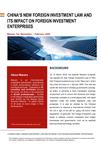
CHINA’S NEW FOREIGN INVESTMENT LAW AND ITS IMPACT ON FOREIGN INVESTMENT ENTERPRISES
Key highlights in The New Law
1. Principles of Equal Treatment of Domestic and Foreign Investment:
(i) Foreign investors seeking to establish business operation in China will be treated exactly the same as domestic companies with simplified registration process, as long as the investment would not be in industry sectors listed on the Negative List. If the foreign investors were to enter into industries in the Negative List, the investment would still be permissible as long as certain requirements specified in the Negative List are fulfilled;
(ii) Foreign invested enterprises are allowed to obtain financing through public offering of stocks, issuing of corporate bonds and other types of securities;
(iii) Foreign invested enterprises would be able to participate in bidding for government procurement and projects through fair competition with domestically owned enterprises; and
(iv) There would be equal treatment for foreign and domestically invested enterprises in making and implementing government policies and regulations.
2. Protecting foreign investment and trade in China:
(i) Freedom of inbound and outbound transactions:
Capital investment, distribution of dividend, payment of interest, paying of royalties on use of Intellectual Property (“IP”) and other compensations that the foreign investors gain legally can be transferred in and out of China freely in RMB or other currencies.
(ii) Protection on foreign company’s IP:
In the past, foreign investors from certain industries were required to look for Chinese partners to set up joint ventures. Often, these Chinese companies would require the foreign investor to share technology or sensitive trade secrets. This practice has been interpreted as the Chinese government encouraging forced technology transfer.
The new Foreign Investment Law provides protection of foreign investor’s IP and prohibits compulsory technology transfer. The Chinese government has clearly stated that “the conditions for technology cooperation in the process of foreign investment shall be decided by both parties through negotiation; administrative authorities shall not use administrative means to force the transfer of technology; and the administrative authorities shall keep confidential of the trade secrets of foreign investors.”
Administrative authorities shall limit the extent, scope and exposure of IP material and content concerning a foreign business’ trade secrets that will be required to be handed over to the administrative bodies.
In addition, punitive damages for infringement of IP rights will be established.
(iii) Channel for appeal and complaints:
The Chinese government will establish appeal mechanisms to make sure that all foreign- invested enterprises will have proper channels to communicate with the relevant authorities regarding their complaints and concerns. The mechanisms will ensure that these complaints and concerns would be addressed in a timely manner.
3. New Regulations on the Type of Foreign-Invested Enterprises
Under the Foreign Investment Law, the organization form of foreign-invested enterprises shall be regulated by the PRC Company Law and the PRC Partnership Enterprise Law as the case maybe.
The Foreign Investment Law replaces the three previous laws, namely the Wholly Foreign- Owned Enterprise Law, the Sino-Foreign Equity Joint Ventures Law and the Sino-Foreign Contractual Joint Ventures Law. Essentially, the WFOE, the Equity Joint Venture (“EJV”) and the Contractual Joint Venture (“CJV”) would be abolished. These entities would be turned into limited liability companies regulated by the PRC Company Law.
It is worth noticing that the Foreign Investment Law provides a five-year transition period for already established foreign invested enterprise formed under the previous WFOE, EJV and CJV laws to turn into limited liability companies, or to undergo any necessary reorganization in respect of the form and structure.
Tax Implications
1. Enterprise formed under the PRC Company Law will continue to be governed by the Enterprise Income Tax Law. There should not be any change for previously established enterprises formed under the WFOE, EJV or CJV laws. In addition, these enterprises would continue to be treated as corporations under the relevant tax treaty.
2. The Foreign Investment Law provides that there is a transition period of 5 years, thus allowing enterprises formed under the WFOE, EJV or CJV laws to be restructured. In the case of joint ventures, the foreign partner should begin to discuss with the Chinese partner, in particularly those formed under CJV laws, in which case, a modification of the group structure may be needed. If the event that group restructuring is required, both parties would need to review the tax implications on the restructuring, e.g., to ensure the restructuring would be eligible for tax free treatment under Caisui (2009) No 59, or would not trigger any un-foreseen tax implications.
3. The supervision and regulation of “investment in domestic enterprises through contracts, trusts and other agreements by foreign investors” have been removed from the final version of the Foreign Investment Law, except this could fall under the “catch-all” clause provision in respect of supervision and regulation. In particular, now that the Negative List has been reduced significantly recently, foreign investment structured through a variable interest structure, the so-called “VIE structure” should be reviewed again. In the event the VIE structure should be restructured, there would be tax implications on the restructuring exercise.
Mazars’ Comments
In a world that is increasingly erecting barriers, the new Foreign Investment Law is a welcome message from the Chinese government that China is open for business. It is no doubt that the law will reshape China’s foreign investment legal regime and will formulate the new landscape of China’s foreign investment in the long run. There are currently nearly 300,000 foreign invested enterprises which were established under the three previous FIE laws. They are given a transition period of five years to restructure. Some of these restructuring may require restructuring of the group structure, including those structured under the VIE structure, it is important that tax advises be sought to ensure that no un-warranted tax implications are triggered. Mazars will be pleased to assist in this area.




